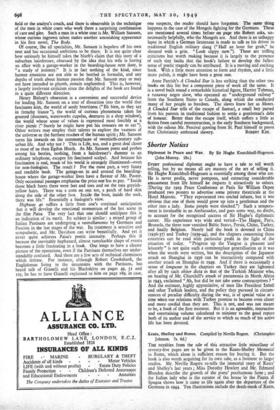Shorter Notices
Diplomat in Peace and War. By Sir Hughe Knatchbull-Hugessen. (John Murray. 18s.)
EVERY professional diplomat ought to have a tale to tell worth telling, but by no means all are masters of the art of telling it. Sir Hughe Knatchbull-Hugessen is essentially among those who are. He is never prolix, never pompous, and extracting considerable amusement from life himself he imparts it attractively to others. (During the 1919 Peace Conference at Paris Sir William Orpen produced two posters to advertise some private theatricals at the Hotel Majestic. "They represented two unclad infants, but it was obvious that one of them would grow up into a gentleman and the other into a lady. Some people were shocked.") Such a tempera- ment is invaluable in an Ambassador, and goes some way, no doubt, to account for the recognised success of Sir Hughe's diplomatic career. His experience was wide and varied—The Hague, Paris, Brussels, the three now vanished Baltic States, Persia, China, Turkey, and finally Belgium. Nearly half the book is devoted to China (1936-37) and Turkey (1939-44), and the chapters concerning those countries can be read with particular profit in the light of the situation of today. "Progress up the Yangtse is pleasant and leisurely" is not quite such a commonplace generalisation as it was when the words were written, but the description of the Japanese attack on Shanghai in 1936 can be instructively compared with another attack on Shanghai in 1949. And if there is occasionally a sense of longueur in the chapters on Turkey they are lightened after all by such obiter dicta as that of the Turkish Minister who, on hearing of Mr. Churchill's attack of pneumonia in North Africa in 1943, exclaimed " Ah, but did he not take some contraceptives ? " And the estimate, highly appreciative, of men like President Inonli and other Turkish leaders, and the policy they pursued in circum- stances of peculiar difficulty during the war, is of special value at a time when our relations with Turkey promise to become even closer and more cordial than they are. This is not, and was not meant to be, a book of the first moment. But it is an agreeable, instructive and entertaining volume calculated to minister to the good repute both of its author and of the service to which so much of his active life has been devoted.










































 Previous page
Previous page